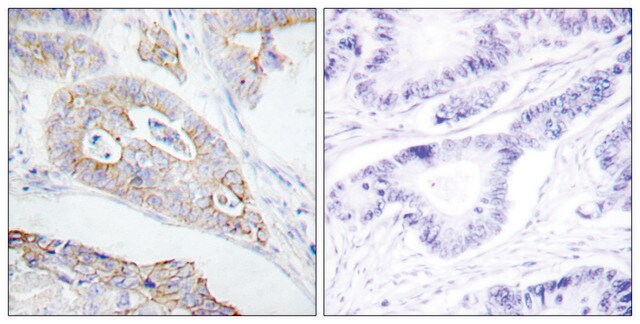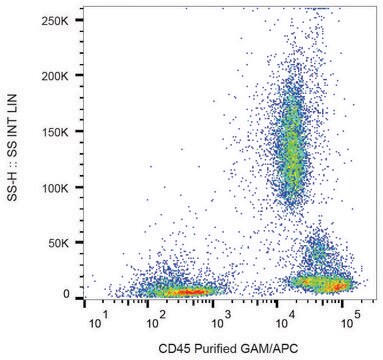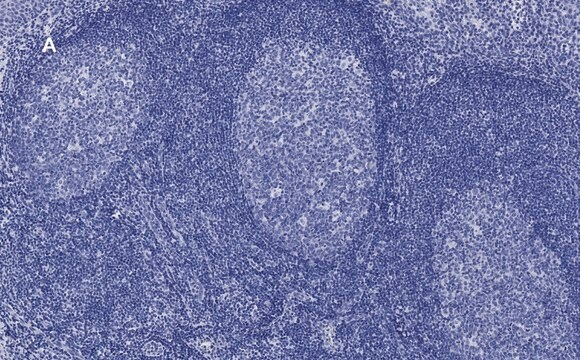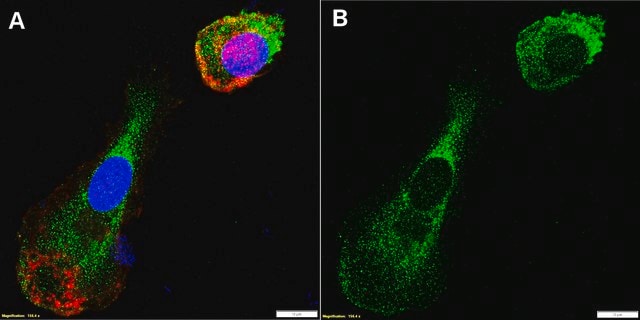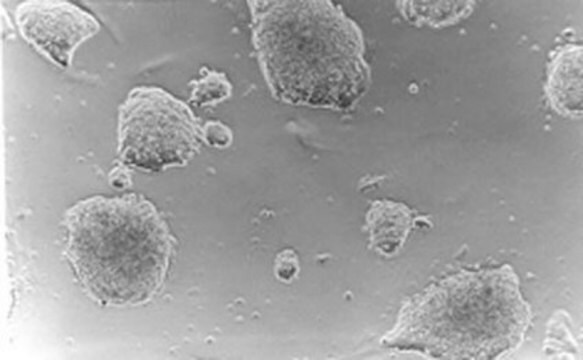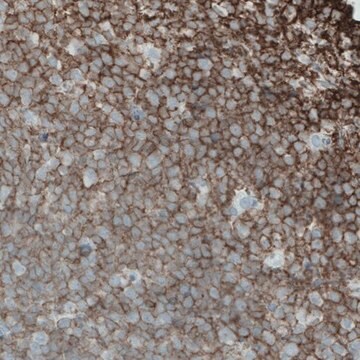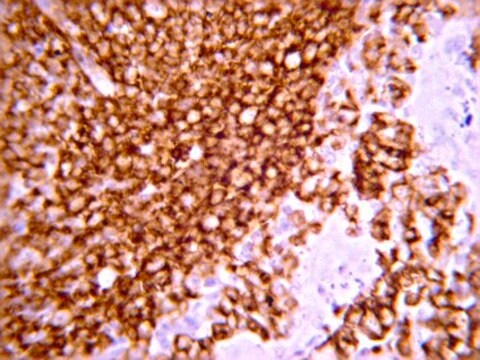SAB4700471
Monoclonal Anti-CD45 antibody produced in mouse
clone MEM-28, purified immunoglobulin, buffered aqueous solution
Sinônimo(s):
Anti-LCA, Anti-PTPRC
Faça loginpara ver os preços organizacionais e de contrato
About This Item
Código UNSPSC:
12352203
NACRES:
NA.41
Produtos recomendados
fonte biológica
mouse
conjugado
unconjugated
forma do anticorpo
purified immunoglobulin
tipo de produto de anticorpo
primary antibodies
clone
MEM-28, monoclonal
Formulário
buffered aqueous solution
reatividade de espécies
human
concentração
1 mg/mL
técnica(s)
flow cytometry: suitable
Isotipo
IgG1
nº de adesão NCBI
nº de adesão UniProt
Condições de expedição
wet ice
temperatura de armazenamento
2-8°C
modificação pós-traducional do alvo
unmodified
Informações sobre genes
human ... PTPRC(5788)
Descrição geral
The antibody MEM-28 reacts with all alternative forms of human CD45 antigen (Leukocyte Common Antigen), a 180-220 kDa single chain type I transmembrane protein expressed at high level on all cells of hematopoietic origin, except erythrocytes and platelets.
Imunogênio
Human thymocytes and T lymphocytes
Aplicação
The reagent is designed for Flow Cytometry analysis. Suggested working dilution for Flow Cytometry is 1 μg/mL of sample. Indicated dilution is recommended starting point for use of this product. Working concentrations should be determined by the investigator.
Características e benefícios
Evaluate our antibodies with complete peace of mind. If the antibody does not perform in your application, we will issue a full credit or replacement antibody. Learn more.
forma física
Solution in phosphate buffered saline, pH 7.4, with 15 mM sodium azide.
Exoneração de responsabilidade
Unless otherwise stated in our catalog or other company documentation accompanying the product(s), our products are intended for research use only and are not to be used for any other purpose, which includes but is not limited to, unauthorized commercial uses, in vitro diagnostic uses, ex vivo or in vivo therapeutic uses or any type of consumption or application to humans or animals.
Não está encontrando o produto certo?
Experimente o nosso Ferramenta de seleção de produtos.
Código de classe de armazenamento
10 - Combustible liquids
Ponto de fulgor (°F)
Not applicable
Ponto de fulgor (°C)
Not applicable
Escolha uma das versões mais recentes:
Já possui este produto?
Encontre a documentação dos produtos que você adquiriu recentemente na biblioteca de documentos.
Bo Peng et al.
The Journal of neuroscience : the official journal of the Society for Neuroscience, 34(24), 8139-8150 (2014-06-13)
Retinitis pigmentosa (RP) is a photoreceptor-degenerative disease caused by various mutations and is characterized by death of rod photoreceptor cell followed by gradual death of cone photoreceptors. The molecular mechanisms that lead to rod and cone death are not yet
Nanna Siegmann et al.
Cellular physiology and biochemistry : international journal of experimental cellular physiology, biochemistry, and pharmacology, 34(1), 56-70 (2014-07-01)
Inflammation is a major and critical component of the lung pathology in the hereditary disease cystic fibrosis. The molecular mechanisms of chronic inflammation in cystic fibrosis require definition. We used several genetic mouse models to test a role of iNKT
Brian Meehan et al.
Mechanisms of ageing and development, 140, 13-22 (2014-07-30)
Antiangiogenic therapies in cancer exert their effects in the context of age-related comorbidities, which affect the entirety of the vascular system. Among those conditions, the impact of atherosclerosis is especially prevalent, but poorly understood, and not reflected in mouse models
Mohammad Atefi et al.
Clinical cancer research : an official journal of the American Association for Cancer Research, 20(13), 3446-3457 (2014-05-09)
PD-L1 is the main ligand for the immune inhibitory receptor PD-1. This ligand is frequently expressed by melanoma cells. In this study, we investigated whether PD-L1 expression is controlled by melanoma driver mutations and modified by oncogenic signaling inhibition. Expression
S Badrnya et al.
Thrombosis and haemostasis, 112(1), 128-136 (2014-02-28)
Circulating plasma microvesicles (PMVs) and their microRNA content are involved in the development of atherosclerosis and could serve as biomarkers for cardiovascular disease (CVD) progression. However, little is known on how smoking influences the levels of PMVs and microRNA signatures
Nossa equipe de cientistas tem experiência em todas as áreas de pesquisa, incluindo Life Sciences, ciência de materiais, síntese química, cromatografia, química analítica e muitas outras.
Entre em contato com a assistência técnica
